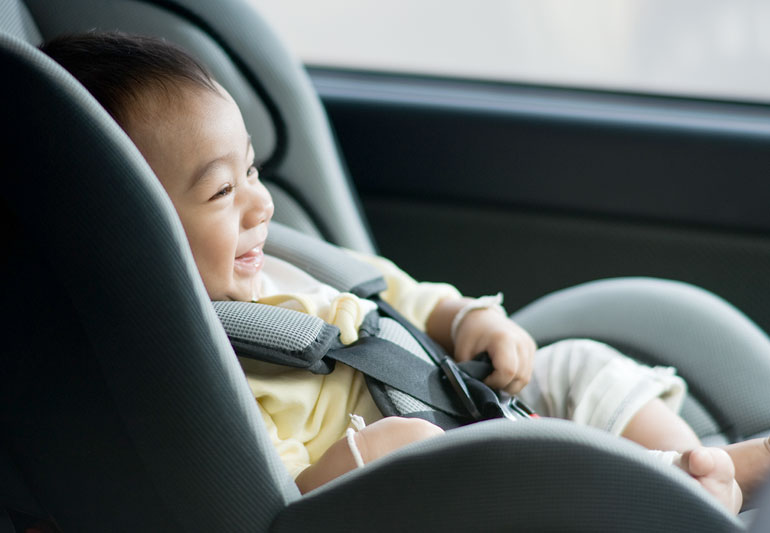

It seems unthinkable, and yet it happens. Every year, children die after being left in the car on hot days — even just for a few minutes.
There are some misconceptions about this issue, as explained by pediatrician Paula Sabella, MD. She separates five common myths from the facts and offers simple, powerful tips to protect children.
Myth: Caring, attentive parents don’t leave their kids in hot cars
Fact: Researchers estimate that half of hot-car incidents involve a loving parent or caregiver who forgets a sleeping child in the backseat (sometimes referred to as Forgotten Baby Syndrome).
“Even a simple change in the child care drop-off routine could confuse sleep-deprived parents and cause them to leave an infant behind, unaware,” Dr. Sabella says.
Myth: If I only leave my children in the car for 10 minutes, they will be OK
Fact: On an 80-degree day, the temperature inside your vehicle can reach a dangerously hot level in as little as 10 minutes.
Myth: If it’s only 60 degrees outside, my car can’t heat up to dangerous levels
Fact: An outside temperature of just 60 degrees F can heat your car to well above 100 degrees F.
Myth: I can gauge the level of heat in the car based on how hot I feel
Fact: A child’s body temperature rises three to five times faster than an adult’s. Their body temperature can rise faster relative to their body surface area.
“Babies bodies’ heat up quicker than adults, and young children don’t have the same ability to produce sweat to cool off,” Dr. Sabella explains.
Myth: Leaving the window cracked open will keep the car cool
Fact: According to researchers at the National Highway Traffic Safety Administration, a car’s windows act as a greenhouse, and cracking one does little to keep the car cool.
“A cracked window shouldn’t give anyone a sense of security when there’s a child in the car,” Dr. Sabella says.
Tips for parents
“The take-home message here is that there truly is no safe temperature or length of time in which a child should be left in a car alone,” Dr. Sabella says. “Period.”
She offers some commonsense tips to help parents and caregivers form the kind of daily habits that can prevent hot car deaths.
- Position your child’s car seat so that it is not directly behind the drivers’ seat. A passenger-side car seat allows parents to see the child more easily, lessening the likelihood of deadly forgetfulness.
- Place an important item, like a purse, cell phone or employee ID badge in the back seat with your child. When you arrive at your destination, you’ll have to grab it from the back seat, where you’ll see your child as well.
- Keep a stuffed animal, diaper bag or other visual cue on your front seat when your baby is in the car. Using a visual cue like this can help because babies fall asleep and can’t always give you an auditory clue.
- Get into a regular habit of looking in the back seat before you lock your car doors.
- Instruct your child’s caregiver to give you a call if your child doesn’t show up by a certain time.
- If your child is playing outside and disappears for a few minutes, check the car immediately, including the trunk. It’s possible for kids to accidently lock themselves in a parked car.
Most hot car deaths are accidental, yet there’s never a good reason to leave a child alone in the car for any length of time. If you see an infant or child in a parked car and no adults are present, it’s important to be a good citizen.
“Don’t hesitate to call 911,” Dr. Sabella reiterates. “It could save a life.”
more recommended stories
 AI Predicts Chronic GVHD Risk After Stem Cell Transplant
AI Predicts Chronic GVHD Risk After Stem Cell TransplantKey Takeaways A new AI-driven tool,.
 Rising Measles Cases Prompt Vaccination Push in NC
Rising Measles Cases Prompt Vaccination Push in NCKey Highlights 15 confirmed Measles cases.
 High-Fat Diets Cause Damage to Metabolic Health
High-Fat Diets Cause Damage to Metabolic HealthKey Points Takeaways High-fat and ketogenic.
 Chronic Brain Compression Triggers Neuron Death Pathways
Chronic Brain Compression Triggers Neuron Death PathwaysKey Takeaways Chronic brain compression directly.
 Texas Medical Board Releases Abortion Training for Physicians
Texas Medical Board Releases Abortion Training for PhysiciansKey Takeaways Texas Medical Board has.
 Needle-Thin Brain Implant for Layer-Specific Brain Research
Needle-Thin Brain Implant for Layer-Specific Brain ResearchKey Takeaways Researchers have developed a.
 Pancreatic Cancer Research: Triple-Drug Therapy Success
Pancreatic Cancer Research: Triple-Drug Therapy SuccessKey Summary Spanish researchers report complete.
 Immune Cell Epigenome Links Genetics and Life Experience
Immune Cell Epigenome Links Genetics and Life ExperienceKey Takeaway Summary Immune cell responses.
 Chronic Pain Linked to CGIC Brain Circuit, Study Finds
Chronic Pain Linked to CGIC Brain Circuit, Study FindsKey Takeaways University of Colorado Boulder.
 High-Intensity Training and Oxidative Stress Insights
High-Intensity Training and Oxidative Stress InsightsNew Evidence Linking High-Intensity Training and.

Leave a Comment